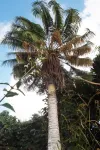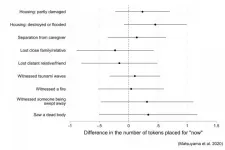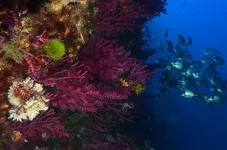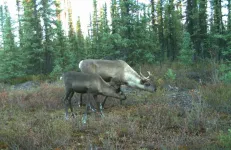The impact of geopolitical boundaries on cycad conservation efforts
Conservation measures across multiple governments and countries necessary to mitigate extinction risks
2021-03-18
(Press-News.org) Geopolitical boundaries can have a profound effect on the protection of threatened species. A case in point is the native cycads of the United States. A recent review paper written by researchers at the Western Pacific Tropical Research Center at the University of Guam highlights extinction risks of cycad species that occur in U.S. controlled lands and the profound effect geopolitical boundaries has had on the protection of these threatened species. The paper appears in the December 2020 issue of the MDPI journal Diversity.
Cycads are the most threatened plant order worldwide. This is due to a combination of factors including habitat loss, poaching predation by invasive species, and lack of appropriate conservation measures. As a native habitat for this most endangered group of plants in the world, the United States has a responsibility to protect members of this group from extinction.
Species arise over time via several mechanisms. One of these mechanisms is called allopatric speciation, which is separation and isolation through geological time. The eventual result is a distinct species that is different from the original population. This is especially true for islands where plants and animals are isolated and evolve without defenses from plants and animals that do not occur naturally in their environment.
Since the dawn of the Anthropocene, humans have made attempts to classify life based on a hierarchy. Additionally, countries have been established and each country has unique laws pertaining to the conservation of nature. The United States is one such country with a rich history of geopolitical expansion. Over time, U.S. geopolitical changes have altered the number of cycad species that come under U.S. political purview. There are presently five cycad species that come under U.S. jurisdiction: Zamia integrifolia in the Southern United States; Zamia erosa, Zamia pumila, and Zamia potoricensis in Puerto Rico; and Cycas micronesica in Micronesia.
The only cycad species endemic to Micronesia, Cycas micronesica, is listed as "threatened" by the U.S. Fish and Wildlife service and "endangered" by the International Union for Conservation of Nature. Once the most abundant tree in Guam forests, the Cycas micronesica has drastically declined in number since the accidental introduction of several invasive insects to Guam. Additionally, extinction of this cycad would constitute the loss of the only native gymnosperm in the region. Due to the shifting geopolitical designations, this cycad is found within four different political entities.
The authors highlight that species were distinct long before geopolitical boundaries were erected. For example, saying that these are "U.S. cycads" is purely a human distinction. Furthermore, the classification of life into a hierarchy is an anthropogenic attempt to understand biology.
"As taxonomy changes in light of new morphological and genetic evidence, the need becomes clear to use the best available science to inform conservation efforts. Coordinating conservation measures across multiple governments and countries often presents unique challenges but is necessary to mitigate extinction risks," said Benjamin Deloso, a cycad specialist at UOG.
INFORMATION:
[Attachments] See images for this press release:

ELSE PRESS RELEASES FROM THIS DATE:
2021-03-18
Shipping provides the very foundation for world trade, by moving an estimated 11 billion tonnes of goods a year from where they are produced to where they will be used. From TVs to toasters, soap to sugar -- much of it moves over the waves.
Yet for ships plying the open ocean and for offshore industries, waves present an enormous challenge --because they can increase operational risks, reduce operating efficiency, and be dangerous if large enough and not handled well -- and they can be difficult to predict.
Ships can access information about wave heights, directions and frequency, but those data may be expensive to obtain or delayed because of satellite communication limitations, says Zhengru ...
2021-03-18
Undocumented women in Finland access pregnancy care later than others. Yet, screening of infectious diseases at the early stages of pregnancy would be particularly important to these women, a new study carried out in Helsinki, Finland, shows. Conducted by the University of Eastern Finland and the University of Helsinki, the study on undocumented women's pregnancy care and childbirth was published in BMC Pregnancy and Childbirth.
Undocumented pregnant women constitute a vulnerable group of people who lack equal access to pregnancy care. Previous ...
2021-03-18
Study finds that children who experienced housing loss in the 2011 Great East Japan Earthquake are more inclined to opt for short-term gratification
Tokyo - Living through a tragic event might make us more inclined to live for the moment, but not always in a good way. Research is looking into the psychological after-effects among children who survived the 2011 Great East Japan Earthquake, and a recent study may have made a connection: the children may forgo greater long-term reward for short-term pleasure.
Among the traumatic experiences in the quake and subsequent tsunami that killed almost 16,000 people, some survivors witnessed people washed ...
2021-03-18
In their pursuit of maximum reward, people suffering from gambling disorder rely less on exploring new but potentially better strategies, and more on proven courses of action that have already led to success in the past. The neurotransmitter dopamine in the brain may play an important role in this, a study in biological psychology conducted at the University of Cologne's Faculty of Human Sciences by Professor Dr Jan Peters und Dr Antonius Wiehler suspects. The article 'Attenuated directed exploration during reinforcement learning in gambling disorder' has appeared in the latest edition of the Journal of Neuroscience, published ...
2021-03-18
In cancer immunotherapy, cells in the patient's own immune system are activated to attack cancer cells. CAR T cell therapy has been one of the most significant recent advances in immunotherapies targeted at cancer.
In CAR T cell therapy, T cells are extracted from the patient for genetic modification: a chimeric antigen receptor (CAR) is transported into the cells using a viral vector, helping the T cells better identify and kill cancer cells. When the antigen receptor cells identify the desired surface structure in the patient's cells, they start multiplying and killing the target cells.
CAR T cell therapy was introduced to Finland in 2018, and the treatment form has been used in support of patients suffering from leukaemia and lymphomas.
So ...
2021-03-18
A Delphi survey carried out by Dr Lyn Robinson, Head of Department and Reader in Library and Information Science at City, University of London, and Dr David Haynes, former Visiting Lecturer and Post-Doctoral Fellow in City's Department of Library and Information Science, has revealed priorities for protecting personal privacy online.
Their research study, "Delphi study of risk to individuals who disclose personal information online", published in the Journal of Information Science, was conducted at City in 2019, and is based on the views of a panel of privacy and information security experts.
A literature review, published between 2014 and ...
2021-03-18
For years, in the vastness of our galaxy, astrophysicists have been tracking down pevatrons - natural accelerators of particles with monstrous energies. Thanks to the HAWC Observatory for Cosmic Radiation, another probable trace of their existence has just been found: photons with some of the highest energies. However, what is particularly important is that this time the high-energy photons have not only been recorded, but also their probable place of origin has been determined.
We know they exist, we just don't know where exactly they are or what they look like. Pevatrons - because this is what we are talking ...
2021-03-18
Marine heatwaves are dramatically affecting the marine ecosystems of the world and the Mediterranean is no exception. In the Mediterranean, these extreme climate episodes and its resulting massive mortality of species are getting more and more intense and frequent. To date, most of the studies analysed the effects of these perturbations on specific species and populations, although researchers still do not know how this affects the functioning of the involved ecosystems.
A new study led by the University of Barcelona (UB) and the Institute of Marine Sciences (ICM-CSIC) has stated that marine heatwaves are having a strong impact on the functioning of coraligen, one of the most emblematic ...
2021-03-18
A new study comparing decades of environmental monitoring records has confirmed that Canada's caribou are not faring as well as other animals like moose and wolves in the same areas--and also teased out why.
The study used 16 years of data to examine changes in vegetation, moose, wolves and caribou.
"Caribou are declining across Canada and have been recently lost in the Lower 48 States," says Melanie Dickie, a doctoral student with UBC Okanagan's Irving K. Barber Faculty of Science.
"Understanding why caribou are declining is the first step to effectively managing the species--it tells ...
2021-03-18
Native reptile populations on Christmas Island have been in severe decline with two species, Lister's gecko and the blue-tailed skink, entirely disappearing from the wild. While previously the main driver for this decline is likely predation by invasive species and habitat destruction, a silent killer is now threatening to wipe the species out entirely.
Those bred in captivity on the Australian Territory in the Indian Ocean have also been mysteriously dying, leaving the two species - which number only around 1000 each - in danger of extinction. Veterinary scientists from the University of Sydney, the Australian Registry of Wildlife ...
LAST 30 PRESS RELEASES:
[Press-News.org] The impact of geopolitical boundaries on cycad conservation efforts
Conservation measures across multiple governments and countries necessary to mitigate extinction risks





